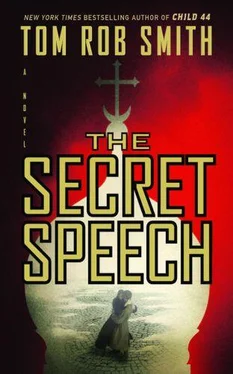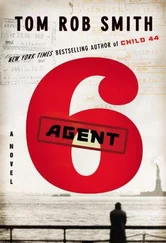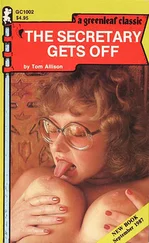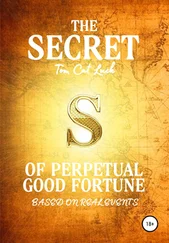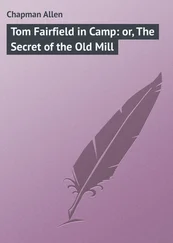Tom Smith - The Secret Speech
Здесь есть возможность читать онлайн «Tom Smith - The Secret Speech» весь текст электронной книги совершенно бесплатно (целиком полную версию без сокращений). В некоторых случаях можно слушать аудио, скачать через торрент в формате fb2 и присутствует краткое содержание. Жанр: Триллер, на английском языке. Описание произведения, (предисловие) а так же отзывы посетителей доступны на портале библиотеки ЛибКат.
- Название:The Secret Speech
- Автор:
- Жанр:
- Год:неизвестен
- ISBN:нет данных
- Рейтинг книги:5 / 5. Голосов: 1
-
Избранное:Добавить в избранное
- Отзывы:
-
Ваша оценка:
- 100
- 1
- 2
- 3
- 4
- 5
The Secret Speech: краткое содержание, описание и аннотация
Предлагаем к чтению аннотацию, описание, краткое содержание или предисловие (зависит от того, что написал сам автор книги «The Secret Speech»). Если вы не нашли необходимую информацию о книге — напишите в комментариях, мы постараемся отыскать её.
The Secret Speech — читать онлайн бесплатно полную книгу (весь текст) целиком
Ниже представлен текст книги, разбитый по страницам. Система сохранения места последней прочитанной страницы, позволяет с удобством читать онлайн бесплатно книгу «The Secret Speech», без необходимости каждый раз заново искать на чём Вы остановились. Поставьте закладку, и сможете в любой момент перейти на страницу, на которой закончили чтение.
Интервал:
Закладка:
Bending down, Fraera scooped up a leaflet fluttering in the gutter — a copy of the revised sixteen points, sixteen demands for change. The points had been formulated yesterday afternoon in a crowded meeting at the Technological University. Unable to pass for a student, Fraera had loitered outside. When she’d heard that the intention of the meeting was to debate whether the students should leave DISZ, the campus Communist Party organization, as a protest against their Soviet rulers, she’d decried their lack of ambition, encouraging her student acquaintances to divert the discussion onto bolder issues. Fraera had been working in this fashion for the past four months, applying pressure, offering material support, and stoking resentment against the occupation as best she could. While the anger was real and deep, she’d struggled to convert sentiment into direct action. There was only so much she could do herself. Her role was to professionalize amateur dissident. Yesterday, finally, there’d been success. With a determination and clarity that surprised Fraera, the students had distilled their debate into sixteen points:
We demand the immediate withdrawal of all Soviet troops, in accordance with the declaration of the peace treaty.
On the scruffy handwritten notes carried out from the hall, that demand had been ranked fourth. Fraera had hurried back to her apartment, transcribing the notes and making one amendment: placing the demand for Soviet troop withdrawal at the top. Within hours her vory were handing out revised copies interlaced with the most provocative extracts from the Secret Speech.
Outside of the few vory , the remnants of her gang, Fraera’s closest associate was Zsolt Polgar, her translator, an engineering student she’d met in a revolutionary underground bar, located in a factory basement. With low ceilings that were never visible because of the thick haze of cigarette smoke, Fraera had found the venue’s population rich in ambition. Zsolt — the son of a wealthy Hungarian diplomat, destined for power and money were he only to conform to the Soviet occupation and find his place within it — spoke fluent Russian and Hungarian and had quickly become Fraera’s most valued intermediary. She humored him, slept with him, beguiling him with stories of her ruthlessness. Appreciating his skills, she flattered him as a libertarian and revolutionary. In reality, she saw him as little more than a rebellious young man, kicking out against his father whom he despised as a sycophantic Soviet appeaser. Regardless of his motivation, he was brave and idealistic, easy to manipulate. He had suggested a demonstration in support of the sixteen points — an inspired notion. As it happened, the idea had been duplicated around the city and Fraera wondered if that might be the work of one of Panin’s other cells. Either way, the result was that tomorrow two marches would set out at the same time, one from either side of the city, joining at Palffy Square. There had been previous shows of disquiet in the capital, none of which had amounted to anything. Fraera was certain that only when people were standing side by side, feeding off each other, was there any chance that the underbelly of anger would transform, like a pupa to a butterfly, from bitter obedience into glorious violence.
Reaching the Astoria Hotel, several blocks from her apartments, Fraera took a moment to observe the crossroads before glancing up at the hotel’s top-floor window. In the last window along, on the corner, a red candle was burning, the quaint signal that she’d devised. In this context it meant she was to come upstairs. Moving around to the back of the hotel, entering through the deserted kitchens, she climbed to the top floor, walking to the room at the far end of the corridor. She knocked. A guard opened the door, gun drawn. There was a second guard behind him. She stepped into the suite, frisked before being ushered next door. Seated at a table, glancing out the window like a contemplative poet, was Frol Panin.
An alliance with Panin, or any man like him, had never been part of Fraera’s plans. Arriving in Moscow, she’d accepted that unless she was content with merely plunging a knife in Leo’s back, she needed assistance. Similarly, Budapest had never been part of her plans. It was another improvisation. With the illusion of Zoya’s death, her original ambition — to bring ruin down on Leo’s hopes of happiness — had been achieved. Leo was tortured as she’d been tortured: the loss of a son paid for with the loss of a daughter. He was broken, forced to live with grief, and not even allowed the fire of righteous indignation that had sustained her through those same emotions. Her revenge complete, she’d been faced with the decision of what to do next. It had become apparent that she couldn’t untangle herself from Panin and melt away. If she stopped being useful to him he would order her death. If she escaped it would be a life of wealth and growing old, a life she had no interest in. Hearing of his international operations, his attempts to agitate disturbances within the Soviet Bloc, she’d volunteered herself and her men. Panin had been skeptical but Fraera had pointed out that she was likely to make a far more convincing agitator against Soviet Russia than the loyal KGB agents he was using.
Panin offered his hand — a polite, formal gesture that she found absurd. Nevertheless she shook it. He smiled:
— I’ve flown over to monitor progress. Our troops are in position on the border. They have been for some time. Yet there is nothing for them to do.
— You’ll get your uprising.
— It needs to happen now. It is of no use to me a year from now.
— We’re on the brink.
— My other cells have had considerably more success than you. Poland, for example…
— The riots you instigated in Poznan were crushed with no serious loss of face for Khrushchev. They did not have the impact you required, otherwise you wouldn’t be bothering with Budapest .
Panin nodded, admiring Fraera’s gift for weighing up situations exactly. She was right. Khrushchev’s plans to scale back the conventional military had not been derailed. They were a central platform of his reforms. He had argued that the Soviet Union no longer needed so many tanks and troops. Instead, they had a nuclear deterent and were building an experimental missile delivery system that required no more than a handful of engineers and scientists, not millions of soldiers.
Panin considered the policy foolhardiness of the most dangerous kind. Aside from the inadequacies of the missiles, Khrushchev had fundamentally misunderstood the importance of the military, just as he’d misunderstood the impact of his Secret Speech. The military existed not solely to protect against external aggressors; its purpose was to hold the Soviet Union together. The glue between the nations of the Soviet Bloc wasn’t ideology but tanks and troops and planes. His proposed cuts, combined with the reckless sabotage inflicted by his speech, were putting their nation in peril. Panin and his allies were arguing that not only must they maintain the size of the conventional army but they must also extend and rearm it. They must increase spending, not decrease it. A disturbance in Budapest, or indeed in any other East European city, would prove that the entire fabric of the revolution depended upon its conventional military might, not merely its nuclear arsenal. Several million men with rifles were useful in reminding the population, at home and abroad, who was in control.
Panin said:
— What news do you have for me?
Fraera handed him the leaflet printed with the sixteen points:
— There’s going to be a demonstration tomorrow.
Читать дальшеИнтервал:
Закладка:
Похожие книги на «The Secret Speech»
Представляем Вашему вниманию похожие книги на «The Secret Speech» списком для выбора. Мы отобрали схожую по названию и смыслу литературу в надежде предоставить читателям больше вариантов отыскать новые, интересные, ещё непрочитанные произведения.
Обсуждение, отзывы о книге «The Secret Speech» и просто собственные мнения читателей. Оставьте ваши комментарии, напишите, что Вы думаете о произведении, его смысле или главных героях. Укажите что конкретно понравилось, а что нет, и почему Вы так считаете.
